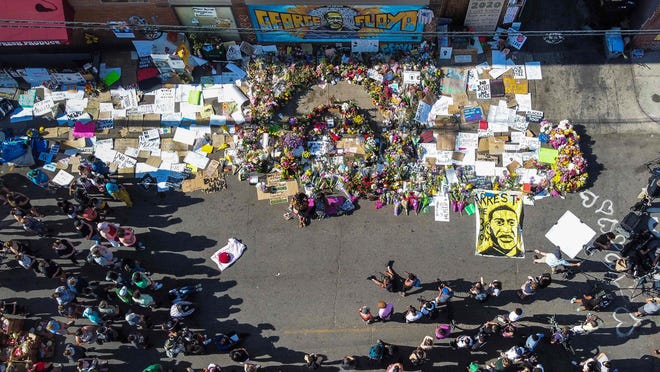INDIANAPOLIS — Tyler Newby, the man whose criminal case became seen as a litmus test on the limits of self-defense during the riots and protests that gripped downtown Indianapolis in 2020, will not go to prison.
Newby was convicted of reckless homicide in October despite originally being charged with murder. He fatally shot 18-year-old Dorian Murrell in the heart the morning of May 31, 2020.
Marion Superior Judge Angela Davis sentenced him to four years on probation and a year of home detention Thursday.
Newby’s attorneys said the act was self-defense. Murrell, who was with a group of people police say committed multiple crimes, including murder that weekend, allegedly shoved Newby to the ground right before being shot. Prosecutors argued the shooting wasn’t self-defense because shooting someone is an extreme response to being shoved.
Newby’s first trial ended in a mistrial. Jurors couldn’t agree on a verdict.
During the sentencing hearing Murrell’s grandmother, Artonia Armstrong, called the case a tragedy for both families.
“As human beings we need to start thinking more before we react,” she said.
“I just wanna say, Tyler, I forgive you.”
The judge told Newby she didn’t side with the self-defense argument because self-defense applies when a crime against the person has been committed. There’s no evidence Murrell’s actions during the encounter placed Newby in imminent danger, she said.
She also criticized Newby for heading to the heart of downtown with a loaded firearm after protests over the police murder of George Floyd and killings of other Black Americans devolved into riots.
From 2020:Breadth of George Floyd protests – most peaceful – captured by data
The sentencing hearing was punctuated by outbursts and tears from the audience, prompting Davis to ask the courtroom to keep quiet.
The biggest exclamation came after Indianapolis Metropolitan Police Det. Stephen Smalley, who was called to the stand by Newby’s attorney, told the courtroom Murrell would have been charged with robbery and murder in connection with the shooting death of Chris Beaty, a former IU football player who was fatally shot in downtown the last weekend of May 2020.
“I don’t think he belongs in jail,” Smalley said about Newby. The remark was rare testimony from an active police officer, and it was met with gasps and groans by the audience.
Three people have been charged with Beaty’s murder: Alijah Jones, Nakeyah Shields and Marcus Anderson. They also face armed robbery charges. Murrell was with them when they allegedly committed their crimes.
Prosecutors argued that any crimes committed before Murrell’s shooting shouldn’t be given weight in the case because Newby didn’t know Murrell was involved in any illegal activity that night.
Long-time family friends told the court Newby was a good person and was never known for being violent. But Davis pointed out that he did have a criminal history, albeit a minor one. He was charged with trespassing and at least one other minor crime when he was a juvenile. He also pleaded guilty to a misdemeanor possession of marijuana charge in 2009.
Newby had only a few sentences to say when it was his time to speak. “I would just like to apologize to the family,” he said. He wished “none of this ever happened.”
Newby’s mother is dealing with lung cancer that has metastasized to her brain, witnesses said Thursday, and Newby is newly a father. That influenced Davis. The judge said a prison sentence for Newby would cause undue hardship for his family.
But she also said at least his family still had him in their lives.
“Your family gets your back, no matter what I do,” Davis said. But “you took their son’s life.”
After the sentencing hearing a sheriff’s deputy discreetly escorted Newby’s family out the building through a stairwell tucked in the back of the 4th-floor hallway, as two members of the court audience in support of Murrell protested the sentence outside the courtroom doors.
Follow Johnny Magdaleno on Twitter @IndyStarJohnny


